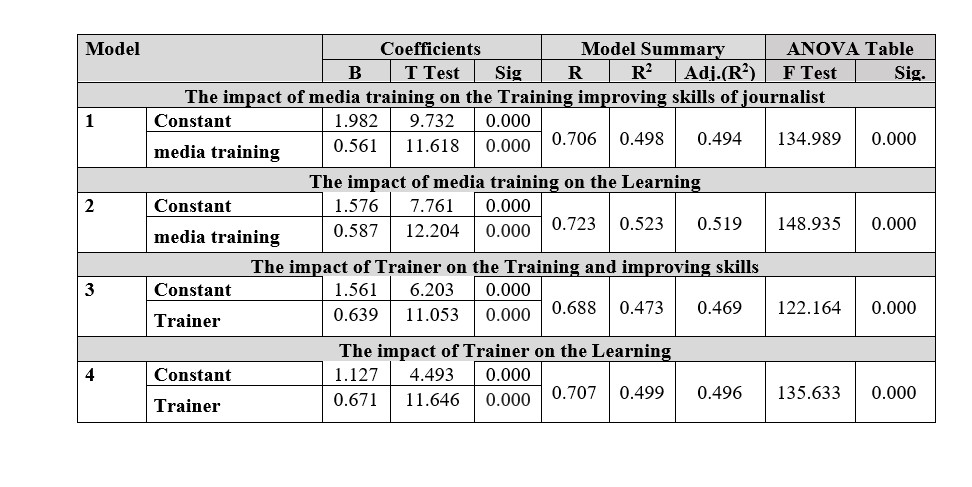The role of media training in improving the skills of journalistsin Kurdish media organisations
DOI:
https://doi.org/10.21271/zjhs.27.6.18الكلمات المفتاحية:
Training، Learning، Trainer، Media skills in KRIالملخص
This paper will examine the role of media training on the improvement of journalists’ skills, ability and experience in their everyday practices in Kurdish media organisations. The article will examine the case of Kurdish media trainers and participants in media training, for instance professional journalists and junior journalists in the field of media. This paper is primarily based on the use of a survey method and online questionnaire. Furthermore, the article will concentrate on the role of media trainers in delivering new information to participants through the media training. The research project found that the media trainer plays an essential role in the improvement of journalists and junior journalists of the Kurdish media organizations, especially in the change of new technology which has provided more opportunity to junior journalists to be involved in the process of learning within media training, which has also helped the professional journalists and junior journalists to raise their level of knowledge, experience and skills in the field of media practices. According to the result, the majority of responds of survey conformed that media training supports them to improve learning skills in percentage (58.70%). The findings illustrated the trainees acknowledge that the media raining them assists to better preference in their everyday journalism practices in percentage (51.45%).
المراجع
-Adam, G. S. (2001). The education of journalists. Journalism, 2(3), 315-339.
-Aguinis, H., & Kraiger, K. (2009). Benefits of training and development for individuals and teams, organizations, and society. Annual review of psychology, 60(1), 451-474.
-Álvarez-Arregui, E., Rodríguez-Martín, A., Madrigal-Maldonado, R., Grossi-Sampedro, B. Á., & Arreguit, X. (2017). Ecosystems of Media Training and Competence: International Assessment of its Implementation in Higher Education. Comunicar. Media Education Research Journal, 25(1).
-Brundrett, M., & Silcock, P. (2002). Achieving competence, success and excellence in teaching. Routledge.
-Canter, L., & Wilkinson, E. (2020). Freelancing for Journalists. Routledge.
-Carney, W. W. (2008). In the news: The practice of media relations in Canada. University of Alberta.
-Chalmers, W., Hadlow, M., Jackson, I., & Johnston, S. (2008). My Media Trainer: An Innovative, Interactive Resource to Ensure Sustainability in the Training of Media Professionals
-Creech, B., & Mendelson, A. L. (2015). Imagining the journalist of the future: Technological visions of journalism education and newswork. The Communication Review, 18(2), 142-165
-Duffield, L. (2011). Media skills for daily life: Designing a journalism programme for graduates of all disciplines. Pacific Journalism Review, 17(1), 141-156.
-Evans, P., & Silk, P. (2008). The Parliamentary Assembly: practice and procedure. Council of Europe.
-Folkerts, J. (2014). History of journalism education. Journalism & Communication Monographs, 16(4), 227-299
-Goad, T. W. (2010). First-Time Trainer, The. AMACOM Div American Mgmt Assn.
-Hoeckel, K., & Schwartz, R. (2010). Learning for jobs OECD reviews of vocational education and training. Austria: Organisation for Economic Co-operation and Development (OECD).
-Ismaeli, A. (2015). The Role of The Media in Developing Democracy In Kurdistan: A study of Rudaw Journalists Perspectives, Notions and Attitudes (Master's thesis)
-Kilpatrick, S. (2000). Education and training: Impacts on farm management practice. The journal of agricultural education and extension, 7(2), 105-116.
-Larrondo Ureta, A., & Peña Fernández, S. (2018). Keeping pace with journalism training in the age of social media and convergence: How worthwhile is it to teach online skills?. Journalism, 19(6), 877-891.
-Larrondo Ureta, A., & Peña Fernández, S. (2018). Keeping pace with journalism training in the age of social media and convergence: How worthwhile is it to teach online skills?. Journalism, 19(6), 877-891.
-Masadeh, M. (2012). Training, education, development and learning: what is the difference?. European scientific journal, 8(10).
-McDonald, D. S. (2004). The influence of multimedia training on users’ attitudes: lessons learned. Computers & Education, 42(2), 195-214.
-Moeller, S. D., National Endowment for Democracy, & NED. (2009). Media literacy: Citizen journalists (pp. 1-30). Washington, DC: Center for International Media Assistance.
-Quartey, S. H. (2012). Effect of employee training on the perceived organisational performance: A case study of the print-media industry in Ghana. Human Resource Management (HRM), 4(15), 67-74.
-Rawat, B., & CHAUBEY, D. (2022). Workforce Training and Development For HR Capacity Building In Some Selected SMEs Of Uttarakhand. Book Rivers.
-Salas, E., Tannenbaum, S. I., Kraiger, K., & Smith-Jentsch, K. A. (2012). The science of training and development in organizations: What matters in practice. Psychological science in the public interest, 13(2), 74-101.
-Salas, E., Tannenbaum, S. I., Kraiger, K., & Smith-Jentsch, K. A. (2012). The science of training and development in organizations: What matters in practice. Psychological science in the public interest, 13(2), 74-101.
-Wilson, J. P. (Ed.). (2005). Human resource development: learning & training for individuals & organizations. Kogan Page Publishers.
-Wolny-Zmorzyński, K., Filas, R., & Płaneta, P. (2022). Leksykon terminów medialnych jako próba syntezy wiedzy o mediosferze XXI wieku z polskiej perspektywy. Naukowy Przegląd Dziennikarski, (2 (42)).

التنزيلات
منشور
كيفية الاقتباس
إصدار
القسم
الرخصة
الحقوق الفكرية (c) 2023 Abdulsamad Qadir Hussein

هذا العمل مرخص بموجب Creative Commons Attribution-NonCommercial-ShareAlike 4.0 International License.
Except where otherwise noted, content on this site is licenced
under a Creative Commons Attribution License 4.0 (CC BY- 4.0)









